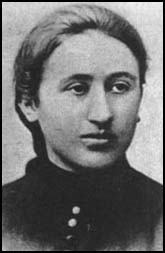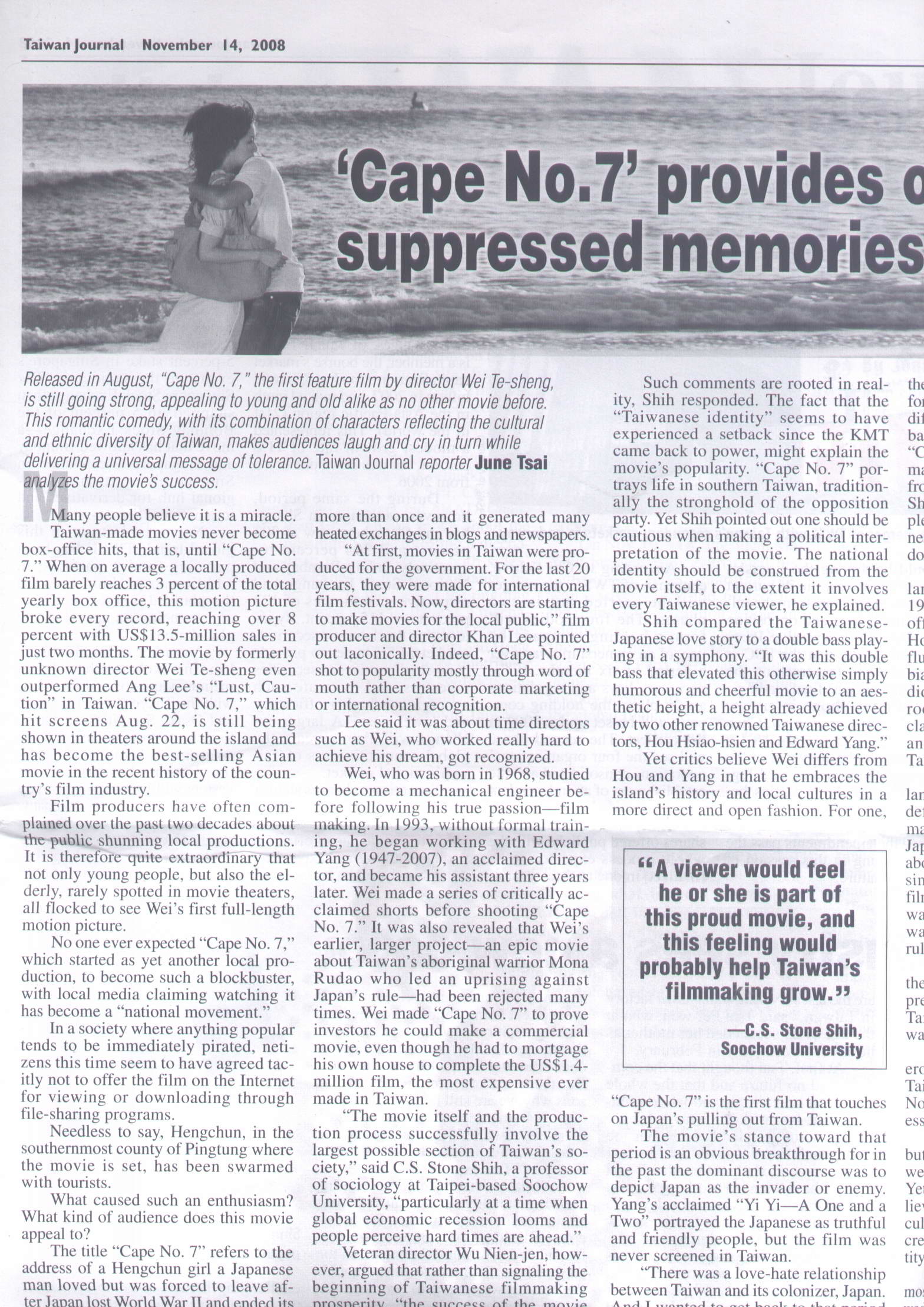石計生教授(C.S. Sone Shih)接受英文週刊Taiwan Journal專訪評論電影《海角七號》Vol. XXV No. 45 November 14, 2008Taiwan Journal Website http://taiwanjournal.nat.gov.tw/ct.asp?CtNode=122&xItem=46100
Cape No.7′ provides outlet for suppressed memories, feelings
◎ By June Tsai
Released in August, “Cape No. 7,” the first feature film by director Wei Te-sheng, is still going strong, appealing to young and old alike as no other movie before. This romantic comedy, with its combination of characters reflecting the cultural and ethnic diversity of Taiwan, makes audiences laugh and cry in turn while delivering a universal message of tolerance. Taiwan Journal reporter June Tsai analyzes the movie’s success.
Many people believe it is a miracle.
Taiwan-made movies never become box-office hits, that is, until “Cape No. 7.” When on average a locally produced film barely reaches 3 percent of the total yearly box office, this motion picture broke every record, reaching over 8 percent with US$13.5-million sales in just two months. The movie by formerly unknown director Wei Te-sheng even outperformed Ang Lee’s “Lust, Caution” in Taiwan. “Cape No. 7,” which hit screens Aug. 22, is still being shown in theaters around the island and has become the best-selling Asian movie in the recent history of the country’s film industry.
Film producers have often complained over the past two decades about the public shunning local productions. It is therefore quite extraordinary that not only young people, but also the elderly, rarely spotted in movie theaters, all flocked to see Wei’s first full-length motion picture.
No one ever expected “Cape No. 7,” which started as yet another local production, to become such a blockbuster, with local media claiming watching it has become a “national movement.”
In a society where anything popular tends to be immediately pirated, netizens this time seem to have agreed tacitly not to offer the film on the Internet for viewing or downloading through file-sharing programs.
Needless to say, Hengchun, in the southernmost county of Pingtung where the movie is set, has been swarmed with tourists.
What caused such an enthusiasm? What kind of audience does this movie appeal to?
The title “Cape No. 7” refers to the address of a Hengchun girl a Japanese man loved but was forced to leave after Japan lost World War II and ended its colonial rule of Taiwan (1895-1945). On his way back to Japan, the man pours his love and regrets into seven letters that he never sends. Sixty years later, the man’s daughter finds the missives after her father’s death and decides to forward them to their rightful owner.
Meanwhile in Hengchun, Aga, an aspiring rock singer, has just come back to his hometown after failing to find success in Taipei. His stepfather–a town representative–is determined to set up a local band and have it play as the opening act of a young Japanese star’s concert. The band has three days to get ready. The movie follows the band’s preparations during this short period.
Viewers laughed throughout the movie before leaving the theaters with tears in their eyes. Many people saw it more than once and it generated many heated exchanges in blogs and newspapers.
“At first, movies in Taiwan were produced for the government. For the last 20 years, they were made for international film festivals. Now, directors are starting to make movies for the local public,” film producer and director Khan Lee pointed out laconically. Indeed, “Cape No. 7” shot to popularity mostly through word of mouth rather than corporate marketing or international recognition.
Lee said it was about time directors such as Wei, who worked really hard to achieve his dream, got recognized.
Wei, who was born in 1968, studied to become a mechanical engineer before following his true passion–film making. In 1993, without formal training, he began working with Edward Yang (1947-2007), an acclaimed director, and became his assistant three years later. Wei made a series of critically acclaimed shorts before shooting “Cape No. 7.” It was also revealed that Wei’s earlier, larger project–an epic movie about Taiwan’s aboriginal warrior Mona Rudao who led an uprising against Japan’s rule–had been rejected many times. Wei made “Cape No. 7” to prove investors he
could make a commercial movie, even though he had to mortgage his own house to complete the US$1.4-million film, the most expensive ever made in Taiwan.
“The movie itself and the production process successfully involve the largest possible section of Taiwan’s society,” said C.S. Stone Shih, a professor of sociology at Taipei-based Soochow University, “particularly at a time when global economic recession looms and people perceive hard times are ahead.”
Veteran director Wu Nien-jen, however, argued that rather than signaling the beginning of Taiwanese filmmaking prosperity, “the success of the movie has more to do with suppressed popular feelings having found an outlet at last.” The fresh film combines distinctive elements of the local Taiwanese culture that appeal to people’s feelings, in particular during politically perturbed times, he observed.
His views echo the editorials of some major Chinese-language newspapers. The Apple Daily described the film as “hitting right on the psychological reality of the rising Taiwanese consciousness.” The China Times praised it as a “love letter to Taiwan,” highlighting “the island’s collective memory.” The New Taiwan Weekly magazine said the film carves out an aesthetic appropriate to the country’s popular culture, systematically suppressed since the end of World War II under the Kuomintang rule.
Such comments are rooted in reality,
Shih responded.The fact that the “Taiwanese identity” seems to have experienced a setback since the KMT came back to power, might explain the movie’s popularity. “Cape No. 7” portrays life in southern Taiwan, traditionally the stronghold of the opposition party. Yet Shih pointed out one should be cautious when making a political interpretation of the movie. The national identity should be construed from the movie itself, to the extent it involves every Taiwanese viewer, he explained. Shih compared the Taiwanese-Japanese love story to a double bass playing in a symphony. “It was this double bass that elevated this otherwise simply humorous and cheerful movie to an aesthetic height, a height already achieved by two other renowned Taiwanese directors, Hou Hsiao-hsien and Edward Yang.”
Yet critics believe Wei differs from Hou and Yang in that he embraces the island’s history and local cultures in a more direct and open fashion. For one, “Cape No. 7” is the first film that touches on Japan’s pulling out from Taiwan.
The movie’s stance toward that period is an obvious breakthrough for in the past the dominant discourse was to depict Japan as the invader or enemy. Yang’s acclaimed “Yi Yi–A One and a Two” portrayed the Japanese as truthful and friendly people, but the film was never screened in Taiwan.
“There was a love-hate relationship between Taiwan and its colonizer, Japan. And I wanted to get back to that period of mixed feelings,” Wei said in a September interview. The movie brought back many unspoken memories moving some elderly viewers to tears.
“Cape No. 7” appeals to most viewers because it epitomizes the kaleidoscopic aspects of the country. The movie addresses its many contrasts without ever taking sides.
Choosing Hengchun as the backdrop is in itself symbolic as it contrasts with metropolitan Taipei, while the town shows signs of contradictions in its progress toward modernity. It has retained its old city walls but has built five-star hotels; it hosts the “Spring Scream” rock festival but is also home to Hengchun folk music.
Moreover, there is an aboriginal policeman and a Hakka salesperson to underline Taiwan’s ethnic diversity, while the 80-year-old postman and the nonconformist young pianist serve to encompass different age groups. Also the amateur band is training in Western-style pop. “Cape No. 7” may lack waishengren –mainlanders who immigrated to Taiwan from mainland China after the war–yet,
Shih reminded, most of the young people in the movie speak Mandarin Chinese, and “it is this ‘absent subject’ that dominates the screen.” When the KMT moved to the island after the Chinese civil war (1946-1950), it made Mandarin Chinese its official language, effectively banning Holo-Taiwanese. Such proscription influenced the media and created certain bias toward the language. Some viewers did criticize the prevalent use of grassroots slang in the film, while others claimed it is overshadowed by Japanese and American subcultures and lacks Taiwanese components.
However, “the use of these various language elements is deliberate,”
Shih defended. “It is natural for the old postman to be able to speak Japanese to the Japanese program coordinator, for the aboriginal policeman and the failed rock singer to fight in Chinese.” Even the film’s motif, Schubert’s “Haidenroslein,” was carefully chosen because the lied was popular during Japanese colonial rule of the island. “The director has interwoven all these ethnic and cultural elements very precisely to reflect the life of ordinary Taiwanese, and he depicted them in a warm and tolerant way,” he argued.
“It is the assimilation of these heterogeneous cultures that make up the Taiwanese identity,”
Shih said, “‘Cape No. 7’ grasps that. It cuts right into the essence of the Taiwanese culture.” “Taiwan experienced several rulers, but the people never had their say. We were educated in the rulers’ languages. Yet when it comes to our identity,
I believe we assimilated aspects of various cultures into our own indigenous one to create a truly original Taiwanese identity,” the professor continuedBecause the daily experiences of most people in Taiwan–the raucous wedding banquet, the macho gangster-like local representative, the depopulation of small towns and its related social problems, for example–are all so accurately represented, and because what was once considered as vulgar and cheap is depicted in a benevolent manner,
“a viewer would feel he or she is part of this proud movie, and this feeling would probably help Taiwan’s filmmaking grow,” Shih said. Director Wei attributed the popularity of “Cape No. 7” to the energy inherent to the people of Taiwan. “What Taiwan wants is a consensus [on its identity]. Once the consensus is built, an unimaginable energy would result from it,” he said. Judging from its performance, the movie might as well be the current common denominator for people of every political spectrum on the island.




